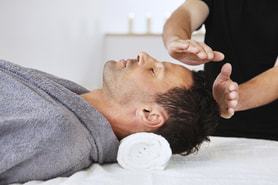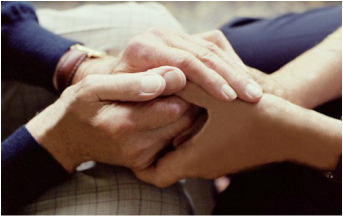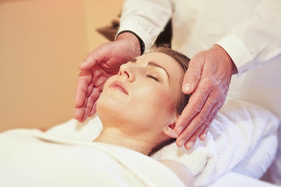What is Reiki? |
Many people have heard of Reiki, but are not exactly sure what it is. The word Reiki refers to both a type of healing energy and to the healing modality that uses this energy. Reiki has many advantages: it is safe, effective, and can help with a wide range of health issues, both physical and mental/emotional. The human body is designed to heal itself and Reiki works gently yet powerfully to support and increase this ability.
|
Clinical Reiki |
As well as being an effective therapy in its own right, Reiki is a very helpful adjunct to mainstream medical treatment, and we call this application Clinical Reiki.
Clinical Reiki is a tailored treatment plan for in- or out-patients, applying techniques that address each person's illness, unique symptoms and personal journey. Patients undergoing medical treatment are often faced with a variety of challenges, both physical and emotional, and Clinical Reiki has been proven to assist patients’ journey to greater health in a variety of ways. |
Reiki Speeds Recovery |
When facing significant health challenges, patients' resources are
impacted not only by the disease or injury they present, but sometimes also by the treatment. Surgery, chemotherapy, radiotherapy and other treatments can be very harsh and, while necessary for the patient’s mid- to long-term health, place new demands on the body. In such situations it makes enormous sense to bolster the patient’s ability to self-heal, and Reiki is the perfect tool to achieve this. Studies have shown that using Reiki in conjunction with standard medical treatment speeds patients’ recovery time, enabling them to return to health, or to proceed with the next stage of their treatment, more quickly. |
Pain Management |
For some patients, the most obvious challenge they face is physical pain. In addition to speeding recovery, Reiki has also been shown to effectively reduce pain levels in patients.
|
Stress Relief |
Needless to say, physical illness also places patients in danger of increased stress. Worry about the outcome of their illness or injury, concern about those around them and dissatisfaction or frustrations with their surroundings in the case of in-patients, can all take their toll. In short, being ill isn’t easy.
Again, this is an area where Clinical Reiki can be extremely helpful. Studies have shown that Reiki works to relieve stress and promote relaxation and a sense of wellbeing, and in fact, some people use Reiki primarily as an antidote to stress and worry. Lessening the stress burden not only leads to a greater quality of life for patients, but contributes to recovery speeds and shorter periods spent in hospital. |
Families |
Hospitals now see the value of providing support to patients’ families and this has often taken the form counseling. However, counseling isn’t for everyone and working on an energetic level rather than a cognitive one suits some people a lot better. Family members, in particular parents of sick children, often experience very high levels of fear, uncertainty and disorientation. Reiki can help them let go of these unpleasant emotions and reach a more grounded space.
|
Quality of Life |
Overall, using Clinical Reiki as complementary therapy to a course of medical treatment can help patients achieve a measurably greater quality of life through speedier recovery, pain relief and a significant reduction in stress. Clinical Reiki can also be of great help to patients’ families who are negotiating this difficult time.
|



